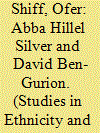| Srl | Item |
| 1 |
ID:
104194


|
|
|
|
|
| Publication |
2010.
|
| Summary/Abstract |
During the years immediately preceding Israel's founding, Abba Hillel Silver was considered the most powerful leader of American Zionism. His leadership was viewed by numerous admirers as epitomising the yearning of the Jewish people after the Holocaust. However, almost immediately after Israel's foundation, he was relegated to the margins of Zionist politics; the more important reasons for this development being his status vis-à-vis the leader of the pre-state Jewish community, David Ben-Gurion, who was elevated to the revered status of the 'founding father' of the recently established state. This article discusses how Silver coped with this new situation, where only his great rival could legitimise him. After realising the futility of challenging Ben-Gurion directly, Silver decided to elevate Ben-Gurion in his speeches to the status of the ideal philosopher-king. The question is whether by doing so Silver accepted the incontestability of Ben-Gurion's charismatic leadership, or whether he was merely attempting to reinterpret Ben-Gurion's new revered status in a way that legitimised his own Diaspora leadership, thus reinforcing a very different national ideology from the Israelocentric one represented by Ben-Gurion.
|
|
|
|
|
|
|
|
|
|
|
|
|
|
|
|
| 2 |
ID:
185598


|
|
|
|
|
| Summary/Abstract |
When the readers of the Ladies Home Journal turned to Thompson’s article, after paging through columns offering housekeeping and beauty advice, they faced a somber shift in tone in the journalist’s descriptions of the Dachau concentration camp. Thompson’s problematic language about civilization, race, and savagery echoed the themes of a novel by one of her favorite authors, Joseph Conrad’s Heart of Darkness, which described another genocidal atrocity at the hands of white Belgians in the Congo. In 1941 she had lamented the shortcomings of journalism to fully represent the war and expressed hope that it would produce “a Victor Hugo, a Sienkiewicz, a Joseph Conrad to record the final triumph of the world’s lost cause through the invincibility of the human spirit.”2 By 1945, however, Thompson herself chose to echo Conrad’s depiction of humanity’s descent into evil rather than the invincibility of the human spirit.
|
|
|
|
|
|
|
|
|
|
|
|
|
|
|
|
| 3 |
ID:
133744


|
|
|
|
|
| Publication |
2014.
|
| Summary/Abstract |
This article examines how the Jewish vote was brought to bear in the presidential elections of 1944 and in the mid-term elections of 194. It also reveals the essential difficulties that American Zionist leaders faced in activating the Jewish vote, and their efforts to cope with the complex challenges of ethnic politics in the US of the 1940s. Documents of American Zionist leaders at the time show that the political use of the Jewish vote, so simple, so natural to the Zionist establishment in Palestine and in the WZO, presented a predicament for the Americans. It began with the need to cover up the very fact of its use and went on to set the political and social identity of some American Zionist leaders on a collision course with the implications of the ethnic vote in the American political arena.
|
|
|
|
|
|
|
|
|
|
|
|
|
|
|
|